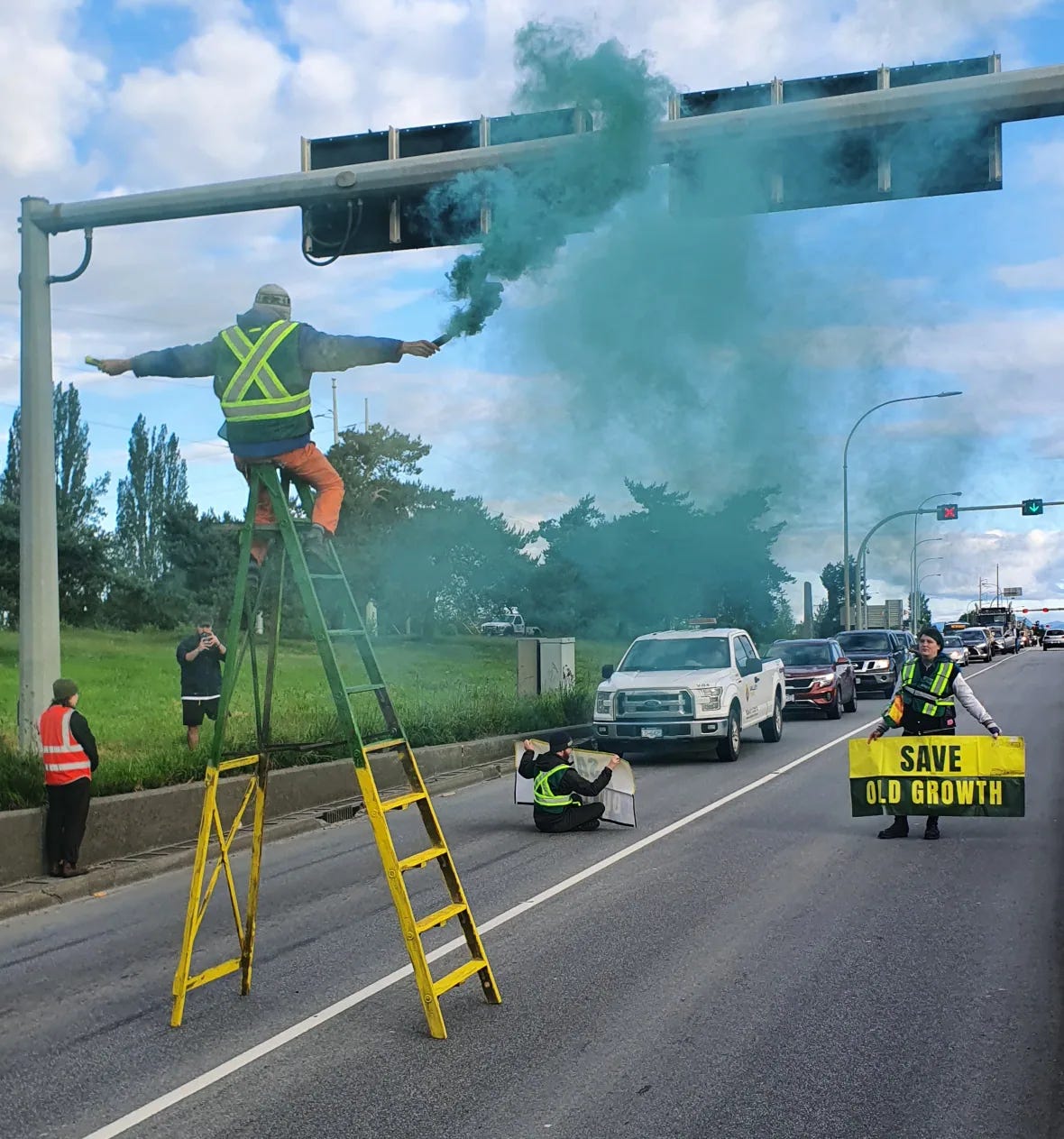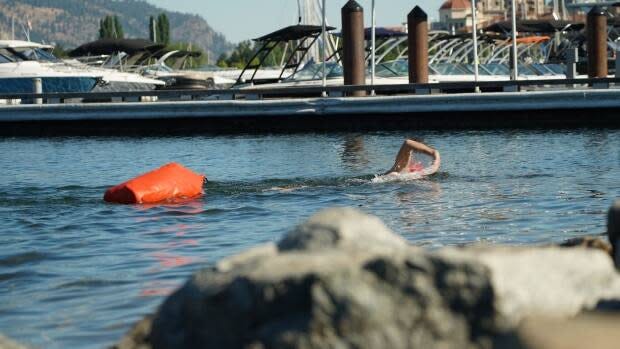Political candour, an ousting, prolific offenders and swimming to work
Or you could just chase the sun...

Hello discerning readers!
In the hopes you were off enjoying your life the last couple weeks, we’ve got you covered.
We’ll start in Alberta, where Deputy Prime Minister Chrystia Freeland was confronted by a vulgar, aggressive conspiracy believing Albertan who seems to equate intimidation and screamed obscenities with the defence of democracy. All of which amounted to the conversational equivalent of driving around with F**k Trudeau (or anyone else, for that matter) spray painted on the side of your truck. Leaders of all political stripes and levels of government across the country condemned the attack, including (eventually) federal conservative leadership candidate frontrunner Pierre Poilievre, who some say is among those stoking divisiveness and distrust of government, fuelling a dangerous upsurge and acceptance of abuse and threats of violence against politicians.
In BC politics, David Eby shared a little unvarnished candour when he lamented having a rival candidate in the NDP leadership race because it will slow his inevitable win and thus his ascension to the premier’s seat. “I'm frustrated because obviously, (Anjali Appadurai) appears to be the only other candidate, which means, assuming I'm successful, it delays moving into the office by several months,” Eby told Vancouver Sun legislative reporter Katie DeRosa. The democratic aspects of ushering in a new party leader – which require a membership-wide vote – can be a frustrating speed bump for a man with a plan. A coronation would’ve been much more efficient.
In fairness, by all accounts, Eby is a duty-bound workaholic and the issues are stacking up like floors on a looming new skyscraper for the next premier to scale – outrageous housing prices, inflation; post-pandemic burnout-caused health care personnel shortages (globally, we might remind everyone); the public service sector strike; inner-city crime, addictions and overdoses; and more. Most of which are unwinnable issues, no government can possibly resolve in an election cycle, never mind in the midst of an economy-grinding pandemic (which we’re not quite out of yet).
The Opposition could gain the most from the crises thundering down upon the New Democrats if BC Liberal Leader Kevin Falcon can reinvigorate his party and present his team as a credible alternative in the eyes of voters. One indicator of Falcon’s ability to lead his party’s renewal will be the results of the upcoming Surrey South by-election.

The reinvigoration may already have begun with the recent ousting of long-time northern MLA John Rustad. Such a decisive move by a caucus leader is rare and usually precipitated by a juicy backstory, involving a litany of inciting events that we’ll likely never know the half of. Publicly at least, Falcon has kept the explanation clean and the team united, stating only that he gave Rustad the boot from caucus after a demonstrated pattern of not being a team player. Rustad seemed nonplussed, but punched back forthwith landing a solid right hook in his very public endorsement of the BC Conservative candidate in the aforementioned by-election.
In Kelowna, RCMP top cop Supt. Kara Triance was in the news advocating for addictions treatment for prolific offenders. This forthright call-out from an organization that deliberately keeps its communications politically agnostic follows an unprecedented public rebuke of a court decision in the form of a public safety warning following the release of a prolific offender into the Kelowna community. The individual was subsequently rearrested on new charges and has been detained in jail awaiting trial. A separate release from the same RCMP detachment described a disturbing account of another repeat offender who was arrested and in need of addictions and mental health treatment. Police would know. The addictions crisis has turned police into medical first responders.
Which brings us to our investigative series If not prison, then where?
Part I: Mean Streets investigates why so many prolific offenders are not in jail.
Part II: Hardest to House asks why people repeatedly committing crimes are unhoused and untreated.
Part III: Is it time for mandatory treatment? will explore the issues, ethics and practicalities of treatment or prison for individuals repeatedly committing crimes (published in September).

This series is a major undertaking spanning months of research and interviews, across multiple communities. Inner cities across the province have become hubs of crime, addiction, and destitution. Almost every B.C. community, large and small – Fort St. John, Nanaimo, Terrace, Prince George, Kamloops, Penticton, Campbell River, Victoria, and others – has its own Vancouver Downtown Eastside. Our series investigates why some prolific offenders are cycling through the justice system and getting dumped on the streets without supports, treatment, housing, or consequences for their crimes. It looks at system failures, massive gaps in services, and where the line is between personal agency and collective rights. Finally, it seeks solutions — what do we need to do to fix this mess we’ve created?
Still on prolific offenders, the government-commissioned panel tasked with recommending measures to “interrupt” their criminal behaviour will report back in mid-September. Mandatory treatment is on the table as a consideration. Then-Attorney General Eby (now stepped aside to run for leader) first mentioned the prospect to Northern Beat in April and has publicly floated out variations of the concept since then. All of which has inflamed human rights and anti-poverty advocate organizations, including two that Eby once led, which called the panel timeline “unethical,” and accused Eby of “throwing human rights, civil liberties and evidence under the bus,” among other things. (Another reason to read up on mandatory treatment issues in our If not prison, then where? series.)
In other news, a B.C. provincial court judge characterized Save Old Growth, and similar groups like Extinction Rebellion, as being “sophisticated, well-organized and well-funded.” The judge accused Save Old Growth senior organizers of staying out of the line of fire themselves, while they “prey on” and “groom” vulnerable people as "sacrificial lambs" to do the frontline protesting in illegal traffic blockades. In a separate incident in June, a protester broke his pelvis after falling from the top of a ‘ladder’ when a motorist knocked out one of the supports. The ladder was blocking the Pat Bay Highway in Sydney at the time. The group has since been threatened by the prospect of a class action lawsuit and said it’s shifting protests away from roadway blockades. Stay tuned for more clashes between protest organizations, the weary public, and the justice system.
Moving from trees to fish, we have Sockeye news. Forecasts of salmon returns in the Fraser River have gone from optimistically upbeat a few weeks ago to dramatically low. The Pacific Salmon Commission reduced its estimated sockeye salmon return forecast by nearly half to about 6 million fish, blaming the effects of “habitat and climate change.” On the upside, salmon in the Skeena River may be enjoying their strongest returns in 20 years. Cooler Pacific Ocean waters this spring may (or may not) have boosted salmon health in other places too, including those from Bristol Bay, Alaska, to Barkley Sound, off Vancouver Island. Either way, their returns have been much better than expected as well. The mysteries of complex coastal ecosystems!
For an uplifting freshwater finish, we have Brent Hobbs, the health care manager who swims to work in the Okanagan (how cool is that). Brent’s main concern sounds like boat traffic on the way home from the office, but mine is that he pulls his laptop behind him in the water. Like, what?! I know those bags are watertight, but still… the idea of submerging a laptop – even in a sealed buoyant bubble – chills my heart. I’d be constantly checking over my shoulder to make sure the laptop was still there, the bag wasn’t ripped, a beaver hadn’t chewed it (read the story, it’s a possibility). Why doesn’t he just leave his computer at work the night before like everyone else who swims to work?
As usual, we left out all manner of fascinating developments, but you know, life is short, it’s warm outside, and the last days (and rays) of summer beckon like a cool glass of prosecco on an oceanside patio.
Thanks for reading, consider a paid subscription if you haven’t already, and please share this newsletter and our stories.
That’s all for now.
Talk to you in September!
Fran







